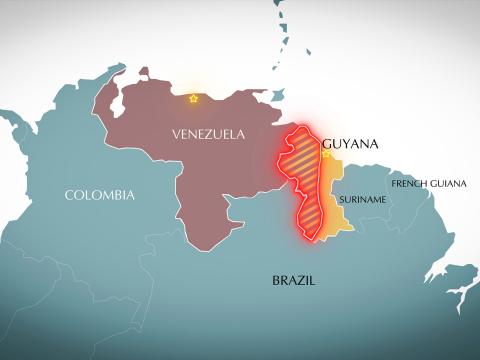China First to The Microphone on Info Ops
With its rapid-fire information operations campaign, China effectively outguns the United States and its partners and allies in the Indo-Pacific region, according to three military officers from the United States and Australia.
The international trio spoke on the third day of virtual TechNet Indo-Pacific conference, which took place March 1-3. During a question-and-answer session following their panel presentation, Brig. Gen. Joel Vowell, USA, deputy director, strategic planning and policy, U.S. INDOPACOM/J-50, explained that the authoritarian regime in China is able to put out a messaging effort very quickly. He described it as a whole-of-government approach involving the military, foreign affairs and other agencies speaking as one party.
Gen. Vowell said that China is “pretty good” at getting its message across. “I would say PRC [People’s Republic of China] does a really good job of trying to be first to the microphone in a lot of these things,” Gen. Vowell stated. “Every day the minister of foreign affairs says a whole lot of great stuff like our State Department does and puts messages out at press conferences.”
Brig. Gen. Joel Vowell, USA, deputy director, strategic planning and policy, U.S. INDOPACOM/J5, speaking about #China #InformationOperations: I would say PRC does a really good job of trying to be first to the microphone in a lot of these things. #AFCEATechNet
— George Seffers (@gseffers) March 4, 2021
The general indicates some key differences between U.S. and Chinese messaging, however. “When you read theirs, you see just how pernicious they are with their methods going forward and the absolute distractions and deflections they have. But here’s the challenge: they can put a message out fast and then we have to react to it. We’re not geared that way,” he asserted.
He described his own experience as a military dependent in West Germany in 1978, during the Cold War. “We had the U.S. Information Agency that had tens of thousands of people across the globe, primarily in Europe, and we were doing operations across the Soviet Union and in Western Europe to deny, disable and discredit Soviet propaganda.”
Gen. Vowell noted that the Information Agency no longer exists. “We have some mechanisms through media, and we have some influence through other governments, but we’re not organized to be able to be ‘firstest with the mostest’ and with the right information.”
And unfortunately, he added, being first often is what matters most. “Truth doesn’t matter. The message first matters, and then trying to get people to the truth is the hard part.”
Brig. Gen. Joel Vowell, USA, deputy director, strategic planning and policy, U.S. INDOPACOM/J5:
— George Seffers (@gseffers) March 4, 2021
The messages that have been coming out [of #China] in the last year are all about the protests in America and what we’re doing against our own people.#AFCEATechNet
Furthermore, whatever messaging the United States attempts to use against China—such as human rights violations—the Chinese will counter by spinning events within the United States. “You can say things about humanitarian crises or issues brought up by China, you can show examples of their behavior that is pernicious, malicious, but the problem is in the West there’s a comparative or corollary example that’s just the same. The messages that have been coming out in the last year are all about the protests in America and what we’re doing against our own people,” Gen. Vowell said, noting that “I term that information warfare, and it’s not necessarily the truth.”
China’s aggressive information operations tactics often leave the United States and others on defense. “We in our values are usually on the defensive. We have good people working this, but right now I would be honest in telling you it’s insufficient in our ability to deal with a nation state that is very good at deceiving in what their saying with audio and video matching.”
Australian Cdre. Luke Charles-Jones, RAN, deputy U.S. INDOPACOM/J-5, agreed, saying Australia, the United States and others must help convince other nations that the economic benefits of working with China come with a heavy cost. “I think our responsibility here is in seeing that misinformation and the malign and pernicious influence of China throughout the region is to spell out to our allies and partners what comes with it,” Cdre. Charles-Jones said. “What are the hooks that come with the offer of the brown paper bags and the money and the incentives?”
He added that countering China’s whole-of-government approach to information operations “requires much more resources to be brought to bear on that.”
Cdre. Luke Charles-Jones, RAN, deputy J-5 at INDOPACOM, on #China #InformationOperations
— George Seffers (@gseffers) March 4, 2021
The PRC by its nature does this whole-of-government approach to messaging. To challenge the messaging of China requires much more resources to be brought to bear on that.#AFCEATechNet
Cdre. Charles-Jones described China’s messaging as “relentless” but said Australia and others have had some success. “You know you’re succeeding when Australia in the last two years has changed its complete attitude toward China’s behavior, as well as New Zealand, and certainly what many of the other partners across the Pacific Islands across Southeast Asia and South Asia are doing.”
He suggested that China’s misinformation campaign is being exposed due to its messaging on the coronavirus. The Chinese government has engaged in vaccine diplomacy while “in the same breath they’re passing misinformation that our Western vaccines aren’t safe, and our vaccines are going to be late and that we’re all focused on our own internal selves first,” he explained. “I know the U.S. administration and certainly Australia are very invested in a global approach to this, and that’s been brought out in some of the recent announcements in the news by the U.S. administration and certainly in Australia and how they seek to support the region.”
Brigadier. Nerolie McDonald, AUA, vice director, intelligence, U.S. INDOPACOM, also agreed that China is largely successful in the information operations arena. “The PRC is outstanding at its information campaign and information operations in both the international and domestic market. It’s got its domestic market sewn up and that’s really hard for us to get in and influence,” she said. “More than anything, changing that domestic perception of what’s happening in the outside world would be the biggest challenge for us going forward.”
Brig. Gen. Nerolie McDonald, vice director, intelligence, U.S. INDOPACOM:
— George Seffers (@gseffers) March 4, 2021
The PRC is outstanding at its info campaign and info ops in both the international and domestic market. It’s got its domestic market sewn up and that’s hard for us to get in and influence. #AFCEATechNet
On the other hand, Gen. Vowell noted some occasional missteps on China’s part. “It doesn’t necessarily mean that you win the argument by being first to the microphone,” he said, recalling an instance during which a Chinese minister of foreign affairs spoke at an international summit and said that Asia is not for Asians but for China. “You just want to hand them the microphone sometimes.”





Comments